Dear Artist,
My recent mention of “Can fundamentalists be creative?” had readers scurrying to the Psychology Today article. When neurologist Ken Heilman and technologist Russ Donda’s observations were first made public in 2007, there was, of course, a great howl from all kinds of religious folks. The howling goes on. In my case, I’m one of those guys who thinks creativity is an equal opportunity situation, and I try to evangelize all comers. The authors of the study defined creativity as the ability to question and conceive things beyond the status quo and diverge from the familiar. They defined fundamentalism as any doctrinal belief system not generally open to scrutiny and likely to be intolerant of other similar systems. In most cases, personal interpretations tend to be marginalized.
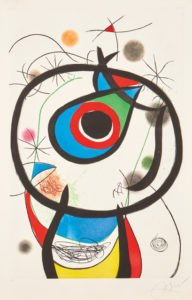
Galathée (Galathea), 1976
Etching and aquatint in colors with embossing on Arches paper.
54 3/10 × 38 inches
by Joan Miró (1893-1983)
Heilman and Donda found fundamentalists to be “poorer in possibilities,” and less able to see the value of play. Among their sources, Heilman and Donda referred to an Israeli study where students in secular schools had significantly higher scores in divergent reasoning than students in religious schools. It seems fundamentalists avoid the psychological pain brought about by examining the outside world and tend not to allow themselves bouts of divergent reasoning. It’s almost like there are two main kinds of people — those who are curious, challenging, inventive and creative, and those who rely on some sort of dogma to make sense of their world. Studies show that creative thinking takes place at the front of the cortex, while further back the brain seems to be more submissive and gullible. To its credit, this back area also features more stable and defensive thinking, and may represent a hangover from primitive times when fear was more in your face.
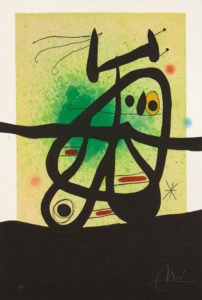
L’Oiseau Mongol (Mongolian Bird), 1969
Etching and aquatint in colors with carborundum, on Arches paper.
40 1/2 × 27 1/2 inches
by Joan Miró
One of the more controversial findings of these studies is that religious fundamentalism may permanently damage the growth of a child’s brain. The thinking goes like this: People with physical damage to their frontal cortex from an accident or medical issues tend to perform poorly in creative thinking. The underutilization of this area, particularly in early life, seems also to impede its proper development and stunt the growth of creativity. In short, fundamentalists may have trouble thinking outside the box.
Best regards,
Robert
PS: “Based on what we know about brain growth, it is possible that a child taught only to follow, and not to personally wonder about or question doctrine, will suffer from an abnormal development of the frontal lobes.” (Ken Heilman)
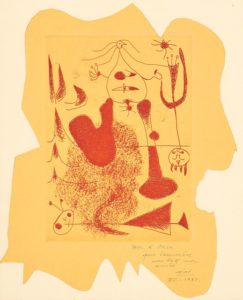
Frontispiece, for Sablier couché
(Reclining Hourglass), 1938
Etching in red, on cut yellow paper,
Chine collé to laid Arches paper.
8 3/10 × 12 1/2 inches
by Joan Miró
Esoterica: One of the tests typically used to determine creativity in young people is to ask them to give alternate uses for common kitchen utensils. The fork, for example, is obviously an instrument for impaling food and bringing it to the mouth. Creative children are likely to suggest its use as a catapult to flick peas, a lever for lifting objects, a small plucked instrument, a tool for scribing parallel grooves in clay or Plasticine, or many other applications. According to these studies, children brought up in rigid religious environments are less likely to use forks to flick peas.
This letter was originally published as “Creativity and Fundamentalism” on April 2, 2010.
Have you considered a Premium Artist Listing? With each letter, an artist is featured at the bottom of this page. The Premium Artist Listings are a means of connecting artist subscribers through their work. Proceeds from each listing contribute to the production of The Painter’s Keys.
“The older I get and the more I master the medium, the more I return to my earliest experiences. I think that at the end of my life I will recover all the force of my childhood.” ( Joan Miró)
Featured Workshop
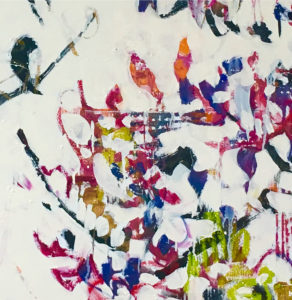 Join Ellie Harold for “Intuitive Painting: Permission to Paint Expressively,” designed especially for mature women artists of all skill levels who wish to explore this medium for soulful exploration. The retreat provides attractive accommodations (your own room!) along with lightly structured activities for centering, relaxation and low stress art-making. You’ll have plenty of free time to muse, paint, write and reflect while enjoying the colors, textures and flavors of San Miguel. This Retreat has the potential to transform not only your art but your life! You’ll return home with a specific art “care plan” to assure support for further creating. Details at www.EllieHarold.com.
Join Ellie Harold for “Intuitive Painting: Permission to Paint Expressively,” designed especially for mature women artists of all skill levels who wish to explore this medium for soulful exploration. The retreat provides attractive accommodations (your own room!) along with lightly structured activities for centering, relaxation and low stress art-making. You’ll have plenty of free time to muse, paint, write and reflect while enjoying the colors, textures and flavors of San Miguel. This Retreat has the potential to transform not only your art but your life! You’ll return home with a specific art “care plan” to assure support for further creating. Details at www.EllieHarold.com.
Featured Artist
A professional painter in both watercolor and oil for over 35 years, I have been creating plein air workshops in Europe for artists to join me since 1996. Plein air is one of the most exciting methods of painting, and I teach a very easy to learn way of capturing the light quickly, that any artist can apply to their own work during our adventures to Europe. Travel for artists is a great way to immerse yourself in painting and make great advances in your techniques by watching other professionals work, and by sharing your own ideas with other artists we all grow! Authentic locations, such as a 12th Century Castle in Ireland, a French Maison in the countryside of France, or an Italian Villa in an historic hilltop village in Italy are carefully chosen. We want our artists and non-painting guests to feel relaxed and at home, with en-suite bedrooms, excellent chef prepared cuisine, and convenient transfers to painting and exploring locations so you can be where you want to be to create. Join me on our next exciting journey!

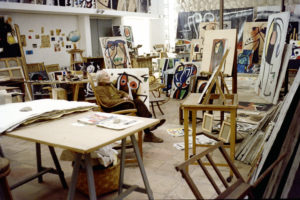
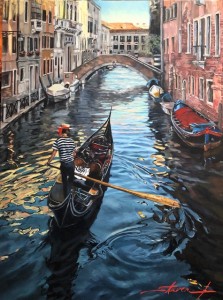


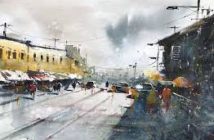
14 Comments
I somewhat generally agree, but as a highly creative person who grew up in a strict religious enviroment it did not inhibit my thinking or freedom of expression as an adult. I surmise it is more of an individual thing of one who chooses to keep the herd mentality. It not only exists in religious groups but today’s culture of group think. Thinking outside the box is a highly creative thing and in my own case requires the tenacity to flow against the winds of what’s approved. I must say now and then it was always challenging and resulted in learning to thrive in solitude. Not fitting in then and now, having that independent streak has always been my forte and it has served me well.
Good for you!
I feel the same Donna! There’s a lot of non questioning Sheppard out there and I get extremely nervous when they all agree on most anything. I’m an outsider and happy to be so
The creative/fundamentalist split needs to be understood as a divergence in ways of thinking, not in kinds of belief. In this reading of the PT article it is easy to privilege rebellion, novelty and individualistic waywardness at the expense of humility and collective wisdom. Look at the long, very long history of art in the West — the history we have inherited — and you will see that the greatest works of art have resulted from engagement WITHIN traditions and various forms of social adherence. The trope of the rebel artist is too simplistic by far. Others have gone before you and whether or not you want to look at their work they are showing the way. You can only build on what they have accomplished. As Bernard of Chartres wisely commented in the mid-twelfth century, we are dwarfs standing on the shoulders of giants.
I was raised in a rural environment by Evangelical parents–my dad a minister–and suffered through my childhood and teens resisting their shut-down, closed-in, fearful, small-mindedness–and managed, somehow, in spite of the cloistering, to maintain an openness to the outside world. And it was a huge release/relief for me to escape to the big city of Toronto (in the wide-open hippie era) to go to art college and find a race of people with wide open minds and eyes not only for art but for world-view. And never looked back … And established a, now 5-decade-long career in free-thought art-making.
Congratulations, Allan, for moving beyond those early barriers!
You probably anticipated that this reprint of the original article after such a great season of disagreement between fundamentalists and those less fundamental would cause a reaction from both extremes. I consider myself a fundamentalist primarily because of the creativity and curiosity I possess. I grew into the person I am and artist I am because of some natural talent and desire as well as from personal discovery and self-education. I have been in leadership roles in both creative industries and in religious circles. I have seen closed mindedness in abundance on both sides of the issue of curiosity and tolerance. I think most of the discussion is best left unsaid where individuals are left to find their inspiration for creativity wherever it may be found without added influence from any presumed position that the gift of creativity exists more on one side or the other. Therefore the opinions of Heilman and Donda fall pitifully short of being more important or influential than my own or anyone else’s.
I completely agree with Dan Killebrew. This is a non-argument and non-issue. Creativity is to be found wherever there is life, and wherever there is humanity. To live is to be creative: i.e., making choices from among a variety of options, prioritizing what is personally significant, creating an environment in which one may live and thrive, sharing of one’s self to improve the condition of others. Creativity is not a skill or talent to be possessed; it is innate in all.
“Fundamentalism” is a broad brush. “Dogma” is imprecise. I have found enormous creative inspiration not only from the dogma I grew up with, but the supposedly stodgy nuns who delivered it. They championed creative work more liberally, in an intellectual sense, than did any of my secular teachers. Fundamentally, my particular dogma teaches humility, which certainly opens the mind and heart to possibilities beyond myself, and that is a pretty good starting point for the aforementioned “thinking outside the box.”
It is true that those brought up in strict Fundamentalism are “raised by the Book”, and if they are
convinced that erring from the mandates of the Book will lead to misery. If they are convinced.
I bumped into Fundamentalism in my early adulthood, and I was certainly convinced that the Book was
a source of wisdom and guidance and principle. But I was also convinced that God is extremely creative and if “man” is created in God’s image, then humans should expect to be creative as well. Discovering color, form, texture, and the many possibilities of expression did not get squelched, I am glad to admit. Rigidness in parental (or school) teaching can certainly take away a child’s freedoms and if it is taught with FEAR, it can certainly hobble the creative mind. I am quite persuaded that this was not God’s intention for anyone.
Fear not, right? What is that you are holding in your hand, Moses? (A paintbrush?)
“The older I get and the more I master the medium, the more I return to my earliest experiences. I think that at the end of my life I will recover all the force of my childhood.” ( Joan Miró ) love that
Artists are passionate people. Religions in the past were bastions of power and great wealth that were patrons of the arts. It’s only reasonable that art history has shown great artists who were involved with the Catholic church such as Tintoretto, who completed such creative and groundbreaking work in Venice back in the day. Yes, he was a devout believer, as were many Old Master painters. I’m not going to be cynical and say, well it was in their interest to believe fundamentally in their patriarchal God as I’m sure they were authentic in their beliefs. It certainly didn’t affect Tintoretto’s out-of-the-box creativity, just as having children doesn’t affect today’s women artists. I still have a whiff of distain for the dogma of today’s religious fundamentalism, if only because I’m a child of the 1960’s. Expanding my reality in the studio means always looking for a way to express myself in a new way: no rules, clear ideas, a different angle, a changed style, medium, subject, or perhaps something completely from the imagination. Belief only in the recurrence of Life. It’s Spring, the old easel on the porch will move out to the backyard garden – just maybe I can capture the birds in flight and think of Leonardo.
Who is to say the fundamentalist child does not flick peas—but only when in private and when unobserved by someone who might frown on such activity?
Martin Luther thought outside of the box.